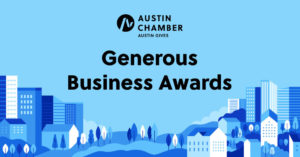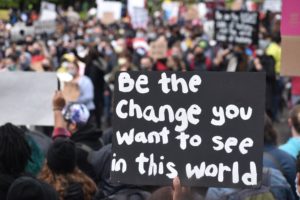We are all aware that the pandemic has drastically shifted the way organizations do business. Many businesses were crippled under the pressures of uncertainty, lack of control, and utter chaos brought on by Covid-19 in 2020. Lost business and revenue forced others to permanently close their doors. But those that were able to pivot, seek new opportunities, and remain focused on the greater good are beginning to re-emerge stronger than ever.
 Bloom’s business model was built on the principle of giving back, shaping our core values, how we conduct business, and the organizations with which we work—making it an authentic part of our work culture. Instead of cowering to the challenges of the pandemic, we met them head-on. Despite the uncertainty of how to navigate the pandemic ourselves, our founder and CEO, Brianna McKinney, encouraged us to lean into our role as experts in communications. This played out in different ways, but most significantly in offering free, 30-minute PR and marketing consultations to businesses in which we brought fresh ideas, support, and peace of mind at a time they needed it most. The consultations and quality time spent listening and coaching remain a highlight of the pandemic for me and helped contribute to the receipt of Bloom’s Generous Business Award in 2020 from Austin Gives.
Bloom’s business model was built on the principle of giving back, shaping our core values, how we conduct business, and the organizations with which we work—making it an authentic part of our work culture. Instead of cowering to the challenges of the pandemic, we met them head-on. Despite the uncertainty of how to navigate the pandemic ourselves, our founder and CEO, Brianna McKinney, encouraged us to lean into our role as experts in communications. This played out in different ways, but most significantly in offering free, 30-minute PR and marketing consultations to businesses in which we brought fresh ideas, support, and peace of mind at a time they needed it most. The consultations and quality time spent listening and coaching remain a highlight of the pandemic for me and helped contribute to the receipt of Bloom’s Generous Business Award in 2020 from Austin Gives.
This past year magnified the need for organizations to clearly define their value, specific to Corporate Social Responsibility (CSR), showcasing how they’re positively impacting their customers, employees, shareholders, and communities in which they live and work. According to a 2019 report from GlobalWebIndex, 68 percent of online consumers in the United States and the UK would consider not using a brand because of poor or misleading CSR, and close to 50 percent were willing to pay a premium for brands with a socially conscious image. Additionally, 2020 emphasized the speed of change specific to CSR, shifting the focus largely from sustainability and climate change to social issues and remote employee support. According to an ACCP/Rocket Social survey of corporate citizenship leaders conducted in 2020, 68 percent of respondents are funding new focus areas in response to the COVID-19 pandemic and the racial justice movement, and many are significantly increasing existing funding to address heightened social issues.
 The pandemic has also taken a toll on employees, which we’ve all experienced firsthand. A research and insights report posted by Microsoft found that over 40 percent of the global workforce is considering leaving their employer this year. Additionally, Carlos Rivera in Cornerstone writes, “One of the main areas that CSR addresses is the welfare of employees and the employee experience. The workforce is made up of stakeholders who act as company ambassadors and are fundamental in influencing the outside world’s perception of the company. Therefore, if employees see that an organization values their contribution and broader external causes, rewards their efforts, and cares about providing a good work experience, they are often more inclined to stay with the company.” I go back to those free, 30-minute consults because they provided a sense of purpose and meaning for our team at a time in which everything else seemed to be spinning out of control.
The pandemic has also taken a toll on employees, which we’ve all experienced firsthand. A research and insights report posted by Microsoft found that over 40 percent of the global workforce is considering leaving their employer this year. Additionally, Carlos Rivera in Cornerstone writes, “One of the main areas that CSR addresses is the welfare of employees and the employee experience. The workforce is made up of stakeholders who act as company ambassadors and are fundamental in influencing the outside world’s perception of the company. Therefore, if employees see that an organization values their contribution and broader external causes, rewards their efforts, and cares about providing a good work experience, they are often more inclined to stay with the company.” I go back to those free, 30-minute consults because they provided a sense of purpose and meaning for our team at a time in which everything else seemed to be spinning out of control.
So the question begs, how can your CSR evolve to meet the new demands brought on by the pandemic, both in terms of giving back and employee attainment/retention?
Remain Mission-Driven
I subscribe to weekly emails from Michael Smart, a national PR thought leader. This week, he passed along a challenge from Pat Brown, founder of Impossible Foods, in which he encouraged each person to “identify the most important problem in the world that I could contribute to solving.” For Brown, that was the catastrophic environmental impact of our use of animals in the food system. For you and your organization, that might be something different entirely. But, I find the challenge motivating and intriguing, both personally and professionally.
According to a 2020 study conducted by Cone Communications, 88 percent of employees believe it is no longer acceptable that companies work just for money; they must also make a positive impact on society. Employees are demanding businesses lead with purpose. So, what is the most important problem in the world to YOU right now and how can you tie it back to your mission?
Be Action-Oriented
 Many organizations suffered paralysis by analysis, unable to make decisions or take action due to the uncertainty of how the pandemic would play out. But, Bloom was proactive in anticipating the potential challenges Covid-19 might have on clients and employees and took action. A decision was made early on to close our physical offices in Austin and Portland and shift to a virtual workforce. This reduced overhead, allowing us to increase our headcount at a time in which so many other organizations were laying people off, and also eliminated the unpredictability of how and when we would be able to return to “normal.”
Many organizations suffered paralysis by analysis, unable to make decisions or take action due to the uncertainty of how the pandemic would play out. But, Bloom was proactive in anticipating the potential challenges Covid-19 might have on clients and employees and took action. A decision was made early on to close our physical offices in Austin and Portland and shift to a virtual workforce. This reduced overhead, allowing us to increase our headcount at a time in which so many other organizations were laying people off, and also eliminated the unpredictability of how and when we would be able to return to “normal.”
Also, recognizing the potential for burnout as everyone was working and schooling from home, Bloom leadership implemented “Half Day Summer Fridays” in which employees were encouraged to give themselves permission to sign off early. According to Forbes, a recent survey conducted by FlexJobs and Mental Health America found that 75 percent of people have experienced burnout at work, with 40 percent saying they’ve felt it during the pandemic specifically. And according to a July MetLife report on the mental health of the U.S. workforce, two in three employers said they expect a mental health crisis in the U.S. within three years. Moving into the fall, we decided to permanently extend Half Day Summer Fridays as a way to support and protect the mental well-being of our employees.
In an email to our team in January titled, “Hindsight is Literally 2020,” Brianna wrote: Reflecting on 2020, I’m so proud of all we accomplished together. We rolled sleeves at lightning speed to transition planned account work to a mixed bag of evolving crisis comms for each and every client. The start of the pandemic affected each of them in a different way and every person on our team instinctively jumped in to help – even when it meant we went outside of our “role.” Actions like that are a direct reflection of our culture and values and speak to why our clients refer to us as partners and extensions of their teams.
This is what it means to be action-oriented. Start taking steps today that will make an impact in solving the most important problem in the world – or addressing the needs of your employees. Your actions, and ultimately, your mission represent not only who you are personally, but as a company.
Shift Strategy, But Remain Humble
 I encourage you to reevaluate CSR because it is the right thing to do for your customers, employees, shareholders, and communities and a way to remain competitive. It should not be done for the sole purpose of getting press coverage for your business or organization. Gone are the days in which a CSR strategy was a nice-to-have, now they are a requirement. If you’re going to be authentic in doing meaningful work, creating valuable give-back opportunities for your employees, and fostering a workplace culture in which your employees feel valued, it needs to be from a place of authenticity. In the words of Gordon B. Hinckley, “Being humble means recognizing we are not on earth to see how important we can become, but to see how much difference we can make in the lives of others.” When you go back to your ‘why’ you will reap the benefits 10-fold.
I encourage you to reevaluate CSR because it is the right thing to do for your customers, employees, shareholders, and communities and a way to remain competitive. It should not be done for the sole purpose of getting press coverage for your business or organization. Gone are the days in which a CSR strategy was a nice-to-have, now they are a requirement. If you’re going to be authentic in doing meaningful work, creating valuable give-back opportunities for your employees, and fostering a workplace culture in which your employees feel valued, it needs to be from a place of authenticity. In the words of Gordon B. Hinckley, “Being humble means recognizing we are not on earth to see how important we can become, but to see how much difference we can make in the lives of others.” When you go back to your ‘why’ you will reap the benefits 10-fold.
Not sure where to start? We can help your business develop an authentic and successful CSR strategy. Check out this blog I wrote in 2018…and as always, should you have further questions, Team Bloom is here to help!
